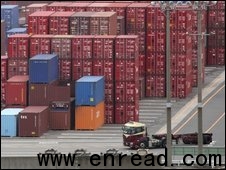| ||||||||||||||||||||||||||||||||||||||||||||||||||||||||
|
Japanese exports slid in July at a faster annual rate than June, raising fears the effects of global stimulus1 measures are starting to decline. 日本七月份出口额较六月份大幅下降,激起对国际经济刺激计划开始衰弱的恐惧。  Falling car sales were partly blamed for declining exports Exports from the world's largest exporter were down 36.5% last month compared with July 2008. Slower car sales to the US, Middle East and Russia were blamed for the decline, which followed June's 35.7% fall. Figures released last week showed that Japan's economy grew between April and June, ending its year-long recession. But economists3 said these latest export figures indicated that reports of a global recovery could have been premature(早熟的,过早的). "Falls in exports have been moderating in recent months on companies' restocking efforts and government stimulus worldwide, but the July data indicate that the recovery momentum4(动力,要素) is losing steam," said Seiji Shiraishi, chief economist2 at HSBC Securities. "It is questionable5 whether exports will continue to recover once the stimulus effect runs out." Salaries falling The Ministry6 of Finance figures showed that exports to the US fell 39.5% in July from the same month last year, which was worse than the 37.6% fall in June. Exports to China were down 26.5%, while those going to the European Union fell 45.8%. Gross domestic product grew 3.7% in the three months from April to June, fuelled by an improvement in exports in the period, but there have been concerns that those figures were boosted by stimulus spending and scrappage(废物) schemes. There are also concerns that domestic demand remains7 weak, with average salaries falling and the unemployment rate at a six-year high of 5.4%. Japan's trade surplus still rose, because imports fell 40.8%, largely due to lower energy costs. 点击  收听单词发音 收听单词发音
|
||||||||||||||||||||||||||||||||||||||||||||||||||||||||
- 发表评论
-
- 最新评论 进入详细评论页>>



